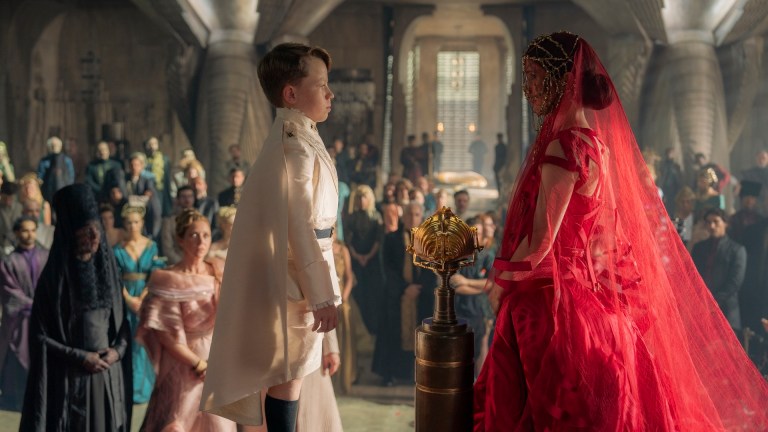Dune: Prophecy Episode 1 Review: An Ineffective Sisterhood
Dune: Prophecy episode 1 "The Hidden Hand" showcases everything that can go wrong when bringing Frank Herbert's world to the screen.

This review contains spoilers for Dune: Prophecy episode 1.
For years, fans considered Dune an unfilmable novel. Dense with lore, full of epigrams and aphorisms, and featuring an inversion of a classical messiah figure, Frank Herbert‘s epic seemed to only work on the page, where the omniscient narrator can explain the true meaning behind a character’s obscure dialogue.
Denis Villeneuve‘s Dune and its follow-up Dune: Part Two seemed to prove that conventional wisdom wrong. Not without its flaws and certainly streamlined, Villeneuve’s adaptations proved that the story of Arrakis could come to the screen.
Now comes Dune: Prophecy to suggest that maybe Villeneuve got lucky.
Dune: Prophecy is easily the worst live-action adaptation of any Dune property – worse than David Lynch’s oddball wonder, worse than the Sci-Fi miniseries of the 2000s. It misunderstands not just the central appeal of Herbert’s work, but also the appeal of Game of Thrones and other TV epics that HBO clearly wants to replicate.
Showrunners Diane Ademu-John and Alison Schapker, the former wrote the premiere “The Hidden Hand” and Anna Foerster directs, do not make things easy on themselves, choosing to build off a little-loved trio of books (written by Frank Herbert’s son Brian Herbert and co-author Kevin J. Anderson) set more than 10,000 years in the future but more than 10,000 years before the events of Villenueve’s Dune movies.
“The Hidden Hand” mostly concerns sisters Valya and Tula Harkonnen (Emily Watson and Olivia Williams, respectively), biological sisters and leaders of a religious order called the Sisterhood, forerunners of the Bene Gesserit seen in Dune. The more enterprising of the duo, Valya wants to continue her mentor’s desire to put a puppet ruler on the Emperor’s throne, giving the Sisterhood someone they can control.
Valya sees her opportunity during the reign of Emperor Javicco Corrino (Mark Strong), a relatively weak ruler who struggles to keep up with the various power plays in his court. These plays include not only the machinations of Valya, but also his wife Natalya (Jodhi May), his daughter Ynez (Sarah-Sofie Boussnina), and Harrow Harkonnen (Edward Davis), the last of whom arranges a marriage to Ynez to his very young son, in hopes of securing spice flow from Arrakis. And then there’s soldier Desmond Hart (Travis Fimmel), who seems to be playing his own game, and Javicco’s son Constantine (Josh Heuston), who seems mostly concerned with being handsome, but might also have other motivations.
Complicating matters for Valya are the fissures within the Sisterhood, which we only begin to glimpse in the pilot. We’re introduced to a number of Sisters who more or less declare their character descriptions and then move on, including Aoife Hinds as the devout Emeline, Chloe Lea as youthful Lila, Jade Anouka as the mercurial Theodosia, and Jihae as the politically-minded Kasha Jinjo.
To its credit, Prophecy seems to anticipate audience confusion. To its great demerit, Prophecy addresses the problem by reducing almost all dialogue to exposition, complete with voice over narration from Valya for the first ten minutes or so of the episode, referencing a war against “thinking machines” and elements that viewers might know from the movies. Even after the voice-over stops, most of “The Hidden Hand” consists of actors reading the Dune fandom wiki to one another in darkened hallways.
Yet, for all its attempts to explain the timeline and characters and basic motivations, Prophecy never creates a legible story, let alone an engaging one. Villeneuve’s adaptation worked not just because it simplified the machinations upon machinations in the book. It worked because he leads with the emotional truth of the characters, giving the actors something to work with.
Because they’re playing wiki entries, even outstanding actors such as Watson, Williams, and Strong get lost. There’s a clear affection between Watson and Williams that gives their interactions some reality, even if they’re just shouting nonsense to one another. Strong isn’t asked to do much but look annoyed and befuddled by everything.
The younger actors don’t fare as well, especially Jessica Barden as teenage Valya. Like everyone else, Barden must try to make exposition sound compelling, but she’s also asked to portray a visionary upstart who changes the course of history, a quality that’s just not on the page or in the performance. When Valya uses the Voice for the first time, the Bene Gesserit power to control people through speech, it sounds like a whiny screech, unable to compel anyone to do anything but turn off the TV.
The most compelling performance in “The Hidden Hand” comes from Fimmel, strangely. Fimmel plays Desmond Hart like he’s Iago in a middle-school production of Othello, broadcasting to the cheap seats his dubious nature. Yet, it’s the most enjoyable bit of the show, possibly because like Dakota Johnson in Madame Web, another bad actor in a bad production, his disdain for the terrible material captures the audience’s frustration.
Whatever the reason, the fact that Travis Fimmel is the standout in a prestige show starring Emily Watson and Olivia Williams proves that Dune: Prophecy is doomed. “The Hidden Hand” ends with a compelling cliffhanger, in which Hart’s attack leaves several visitors to Javicco’s badly burned, including Ynez’s young betrothed. But after the fifty minutes of exposition that preceded it, it seems likely that episode two will just be people explaining the attack to one another instead of responding like real people.
Anyone interested in what happens would be better off reading the Dune wiki and then rewatching any other adaptation. Even flawed but functional takes on Herbert’s world are better than what Dune: Prophecy has to offer.
New episodes of Dune: Prophecy premiere Sundays at 9 pm ET on HBO and Max, culminating with the finale on December 22.
Learn more about Den of Geek’s review process and why you can trust our recommendations here.
